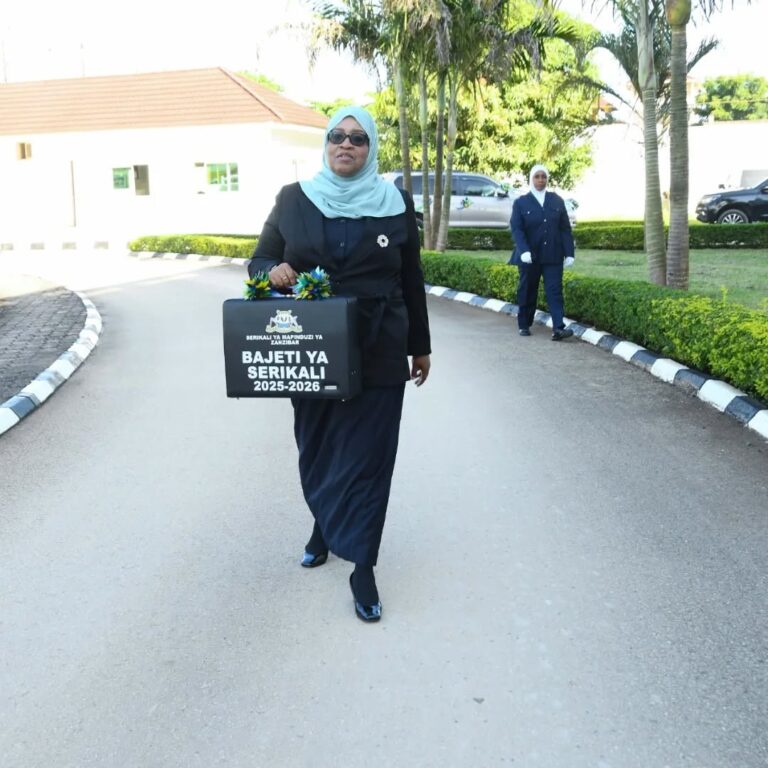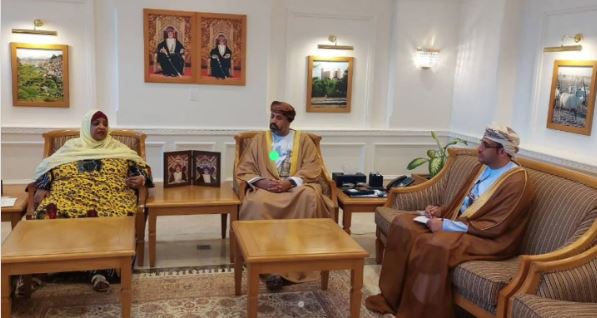Unguja. The Revolutionary Government of Zanzibar has presented a Sh6.98 trillion budget for the 2025/26 financial year, projecting stronger economic growth and intensified domestic revenue mobilisation under a raft of proposed tax and regulatory reforms.
The budget, which represents a 34.7 percent increase from the current financial year’s estimates of Sh5.18 trillion, was presented before the 27th sitting of the 19th House of Representatives held in the archipelago’s legislature on June 12, 2025.
According to the minister of State in the President’s Office (Finance and Planning), Dr Saada Mkuya Salum, the budget comprises funds from both the Central Government and Local Government Authorities, and seeks to stimulate inclusive growth, deepen industrialisation, enhance energy access, and protect the environment, all while strengthening revenue collection and reducing tax burdens for compliant taxpayers.
“In the 2025/26 financial year, total government revenue is estimated to reach Sh6.98 trillion, an increase of Sh1.79 trillion compared to the 2024/25 budget,” Dr Mkuya told the House of Representatives on June 12, 2025.
“Of this, Sh2.39 trillion will be collected from domestic sources, Sh2.78 trillion from external and domestic borrowing for development projects, and Sh1.44 trillion from grants and other assistance.”
The Zanzibar economy is forecast to grow by 7.3 percent in 2025, up from the projected 7.1 percent growth in 2024.
The improvement, the minister said, will be driven by strong fiscal discipline, the availability of affordable petroleum and natural gas, and gains in key sectors including tourism.
“We project a 12.6 percent increase in tourist arrivals from 736,755 in 2024 to 829,929 in 2025,” Dr Mkuya announced.
“This growth reflects our recovery momentum and efforts to expand the tourism value chain.”
Budget growth over time
Over the past five years, Zanzibar’s government budget has grown by a cumulative 228.2 percent, rising from Sh1.57 trillion in 2020/21 to the proposed Sh6.98 trillion for 2025/26.
Development expenditure alone has jumped more than fivefold from Sh609.8 billion to Sh3.27 trillion in the same period.
Recurrent spending, which includes salaries and operational costs, has also nearly doubled from Sh969.3 billion in 2020/21 to Sh1.91 trillion in the upcoming financial year.
“Our increased allocations reflect not only expanded service delivery but also the confidence of our development partners,” the minister said.
“In the past four years, Zanzibar has received $1.79 billion (equivalent to Sh4.88 trillion) in development support, underscoring the strategic value of our projects.”
Domestic revenue and project spending surge
Dr Mkuya reported that actual domestic revenue collection had surged by 172.8 percent, from Sh781.01 billion in 2020/21 to Sh2.13 trillion in 2023/24.
Meanwhile, actual spending on development projects jumped by 558 percent from Sh213.71 billion in 2020/21 to Sh1.4 trillion in 2023/24.
New tax and fiscal measures
To support revenue growth while also protecting the local industry and public health, the government has proposed new infrastructure levies and excise duties on a range of imports and consumables.
Among the measures proposed are:
- A TZS 50 levy per litre on imported bottled water.
- A TZS 1,000 levy per tray of imported eggs.
- A five percent levy on each litre of imported soft drinks, carbonated juices, and non-alcoholic beverages.
- A one percent levy on all imported goods for transport infrastructure funding.
- A five percent levy on imported non-woven plastic bags.
To discourage the consumption of flavoured hookah (sheesha), especially among youth, the government plans to impose a specific excise duty of Sh28,232 per kilogramme of flavoured sheesha.
“Despite a 120 percent excise duty imposed last year, use of sheesha remains widespread, particularly among the youth,” Dr Mkuya noted.
“The new measure is aimed at controlling this trend while also raising Sh1.27 billion to support the Health Fund.”
Additionally, new excise duties of Sh1,000 per kilogramme will be introduced on imported sweets, biscuits, and chocolates to curb excessive sugar consumption, especially among children.
Plastic disposable items such as plates, cups, and bowls will be taxed at five percent per kilogram to reduce environmental degradation.
This is expected to yield an additional Sh547 million for the Environmental Fund.
To further promote environmental conservation, vehicles aged between five and ten years from the date of manufacture will continue to attract the existing 15 percent excise duty.
This is expected to add Sh1.27 billion to government coffers, also earmarked for environmental protection initiatives.
Road fund and fuel levies to be revised
Zanzibar also plans to revise fuel-related levies to increase road infrastructure funding. The proposals include:
- Increasing the road licence fee from Sh38 to Sh100 per litre of imported diesel and petrol.
- Doubling the road fund levy from Sh100 to Sh200 per litre of imported diesel and petrol.
Debt relief and tax arrears forgiveness
Responding to taxpayer concerns over the burden of accumulated tax arrears, interest, and penalties, Dr Mkuya proposed a six-month tax amnesty programme.
“Under this arrangement, from July 1 to December 31, 2025, taxpayers registered with TRA and ZRA will pay the principal tax due and be granted a 100 percent waiver on penalties and interest,” she said.
Customs valuation to be updated
The government is also reviewing outdated customs valuation rates, which currently range between 20 and 50 percent.
It proposes an across-the-board increase of 25 percent on select items such as steel bars, cement, nails, tiles, spirits, wine, and vehicles, to align with the current economic realities.
“This update is intended to broaden the tax base and ensure fair contribution from imports relative to local production,” Dr Mkuya explained.
ZRA to expand revenue collection mandate
From 2025/26, the Zanzibar Revenue Authority (ZRA) will assume responsibility for collecting non-tax revenue to enhance its operational efficiency.
This measure is projected to increase government revenue by Sh7.57 billion.
The proposed 2025/26 budget underscores the Zanzibar government’s ambition to finance development through enhanced domestic revenue mobilisation, strategic borrowing, and tighter expenditure controls.
Parliament is expected to scrutinise the proposals in the coming days before approving the estimates.







